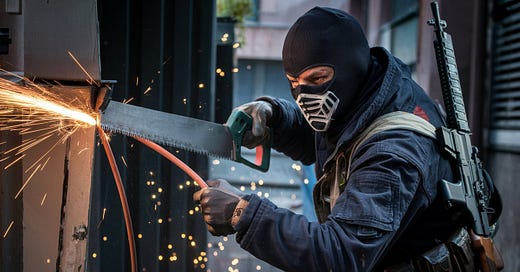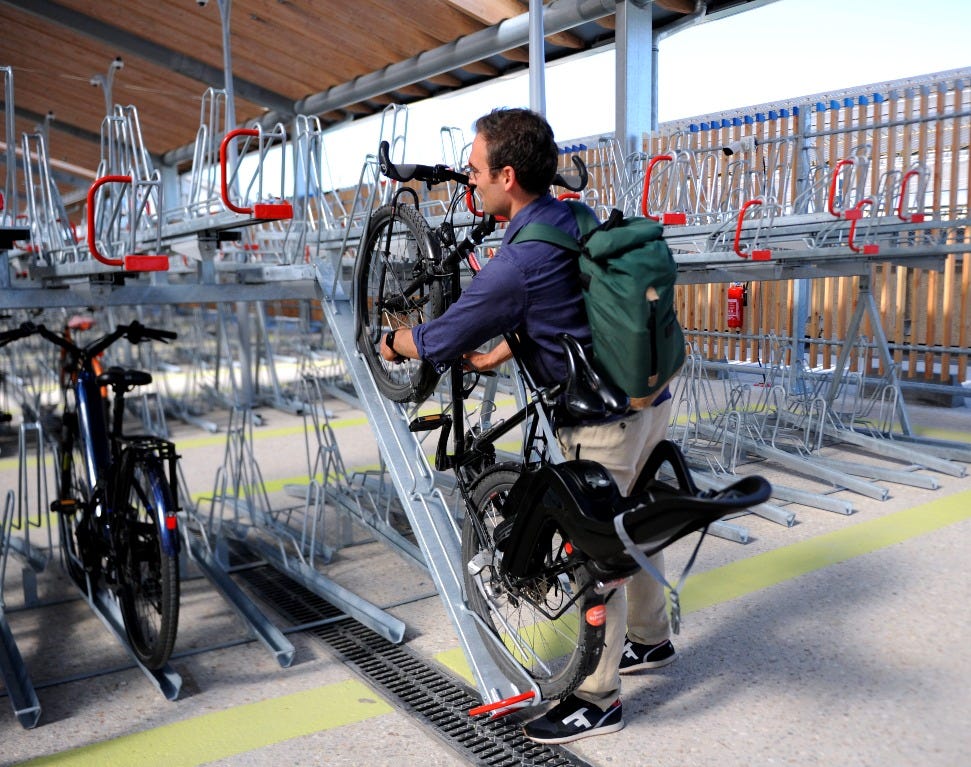Book Preview! The Green Economy Is Hungry for Copper—and People Are Stealing and Dying to Feed It
Plus Europe’s Biggest Train Station Welcomes Bikes; Are EV Battery Chemicals Poisoning Communities?; and more about the real costs of renewable energy and digital tech, and how we can do better.
The Green Economy Is Hungry for Copper—and People Are Stealing and Dying to Feed It
Of all the critical metals we need for renewable energy and digital technology, there’s one that is driving far more death and destruction than any other: copper. Especially in South Africa, where heavily armed copper-thieving gangs have crippled the nation’s energy infrastructure and claimed an ever-growing number of lives. I’ve posted before about the worldwide wave of copper theft, but allow me now to present this full-scale feature on the havoc being wreaked by this indispensable metal: The Green Economy Is Hungry for Copper—and People Are Stealing and Dying to Feed It. It’s an adapted excerpt from my forthcoming book, “Power Metal,” just published in WIRED.
We might be able to reduce our need for metals like cobalt and nickel if new types of batteries really take hold, but there’s no getting away from copper. We need it for every part of the renewable energy system. To quote myself: “We need it for solar panels, wind turbines, and electric vehicles. We need it for the giant batteries that will provide power when the sun isn’t shining and the wind isn’t blowing. We need it to massively expand and upgrade the countless miles of power cables that undergird the energy grid in practically every country. In the United States, the capacity of the electric grid will have to grow as much as threefold to meet the expected demand. A recent report from S&P Global predicts that the amount of copper we’ll need over the next 25 years will add up to more than the human race has consumed in its entire history. ‘The world has never produced anywhere close to this much copper in such a short time frame,’ the report notes.”
Digging up all that copper will inevitably cause enormous damage to the environment. Meanwhile, the price of copper is surging, which “has made electrical wiring, equipment, and even raw metal fresh from the mines into juicy targets for thieves. All around the world, hundreds of millions of dollars’ worth of the metal has been stolen—and countless lives have been lost.” And not just in South Africa. Copper theft is causing chaos in the US and Canada too. Just last week a California man was electrocuted while trying to steal copper cable, sparking an explosion that cut off power to more than 1,500 people.
Crazy, right? And all that’s just the iceberg’s tip. If you want to know the whole story, please consider preordering Power Metal, the book!
Europe’s Biggest Train Station Welcomes Bikes
Paris, France has just taken a big step to encourage more people to get around on bicycles, by opening up a huge, state-of-the-art bicycle parking lot in the Gare du Nord, the busiest train station in Europe. Finding somewhere sheltered and safe to stash your velo can be a hassle in big cities. This new facility provides covered space for up to 1,200 bicycles, and features a guarded entrance, air and repair stations, and automated signs indicating where there are empty spaces. It even has special slots for cargo bikes and other oversize models.
Inciting more people to get around by bicycle is one of the best tactics to reduce our need for critical metals. More bikes=fewer cars=less consumption of metal and energy. So anything that makes biking easier, more convenient, and more appealing can make a real difference. The Gare du Nord is an excellent target: More than 700,000 passengers pass through the station every day, heading for destinations all over the city and beyond. The more of them who arrive by bike, the better for everyone.
Other major European cities are also expanding bike parking, including London. The Netherlands, of course, is way ahead of them—at least for now. The Dutch city of Utrecht is home to the world’s biggest bike parking lot, a three-story colossus that can hold 12,500 two-wheelers. But Paris is aiming to catch up: the city plans to equip its train stations in coming years with 140,000 spaces for bikes.
Are EV Battery Chemicals Poisoning Communities?
As if the destruction caused by mining metals like lithium, cobalt, and nickel to build EV batteries weren’t enough to worry about, it seems some of the chemical ingredients in those batteries also pose serious risks.
“The same companies that spewed ‘forever chemicals’ linked with cancer and other diseases in neighborhoods around the world are now key players in the development of EV batteries—sometimes with hefty taxpayer support. Often those companies keep their chemical formulas and emissions from the public,” write the several journalists involved in this collaborative investigation published in Mother Jones. “Companies making battery chemicals stand accused of misleading regulators, hiding information, and contaminating communities.”
Prominent among those chemicals is PVDF, “a specialty plastic used as a binder to hold battery components into place.” PVDF itself isn’t necessarily dangerous, but manufacturing it “can create byproducts that don’t break down naturally in the body or the environment, known as ‘forever chemicals,’” write the journalists. In recent years, government officials and people living near factories making PVDF for purposes besides batteries have taken the manufacturers to court, charging that those toxic byproducts contaminated drinking water. At least two of those companies have agreed to pay tens of millions of dollars to settle such suits.
Meanwhile, PVDF production is soaring, driven in part by demand from EV makers. Global output is projected to double by 2028—some of it coming from a brand-new plant being opened in the US. Industry practices and government regulations have become more stringent of late, but many concerns remain. Particularly since the key companies refuse to say much about exactly what byproducts their factories are producing, and how they’re getting rid of them.
More News Worth Knowing:
🧂 Lithium Mining May Be Sinking Chile's Atacama Salt Flat
🪶 Apaches Carry Petition to Supreme Court to Stop Copper Mine






